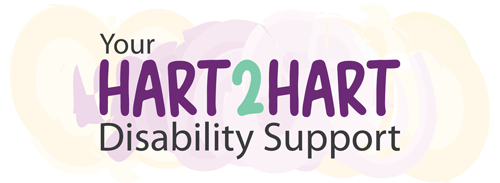Your Hart 2 Hart Community Participation
SERVICE AGREEMENT
Core and Capacity building budgets in your NDIS Plan can be used to access supports such as to assist a participant to engage in community, social and recreational activities during the week (including weekends and public holidays).
Your Hart 2 Hart Pty Ltd charge fees at the rate reflected in the NDIS Price Guide 2022-2023.
If transport is required, you will be charged 1:1 plus up to 60 minutes of travel from our head office in Melbourne CBD. We offer a combination of the following supports:
Support worker using their own vehicle, you will be required to pay $0.85 per km for the workers travel in their own vehicle (including when the participant is not in the vehicle). Any tolls or parking fees will also be charged.
Your Hart to Hart partners with Uber. All expenses in relation to Uber, will be billed back to your plan in hours. We use this support for major sporting events and night time events.
The following are the costs for service for community participation in our groups:
Monday to Friday – 6:00am to 8:00pm:
1 support worker to 1 participant = $62.17 per hour
1 support worker to 2 participant = $34.82 per hour
1 support worker to 3 participant = $25.70 per hour
Monday to Friday – 8:00pm onwards to midnight
1 support worker to 1 participant = $68.50 per hour
1 support worker to 2 participant = $38.36 per hour
1 support worker to 3 participant = $28.31 per hour
Saturday
1 support worker to 1 participant = $87.51 per hour
1 support worker to 2 participant = $49.01 per hour
1 support worker to 3 participant = $36.17 per hour
Sunday
1 support worker to 1 participant = $112.85 per hour
1 support worker to 2 participant = $63.20 per hour
1 support worker to 3 participant = $46.64 per hour
Public Holiday
1 support worker to 1 participant = $138.20 per hour
1 support worker to 2 participant = $77.39 per hour
1 support worker to 3 participant = $57.12 per hour
Capacity building community participation
$70.87 per hour (no uber for weekend)
If there is less than 3 participants in the group, we will charge appropriately as per the above costs.
Your Rights
- You have a right to be communicated with respect
- You have a right to choose to give feedback
- You have a right to accept or refuse service
- You have a right to complain or express grievances about Your Hart 2 Hart or operations
Our rights
- We have a right to be communicated with respectfully
- Fellow participants have a right to be communicated with respect
- We have a right to terminate service if the terms and conditions are not adhered to
- If a worker thinks they are unsafe, they will discontinue or not proceed with the activity and the participant supported to return home
Your responsibilities
- To advise us of any changes to your contact details
- Please bring along your pension card or companion card. If you don’t provide this, you may have to pay for the ticket to the group activity (if applicable)
- To respect the rights, privacy and dignity of Your Hart 2 Hart staff and other participants
- To take responsibility for yourself and the results of any decision you make
- To not drink alcohol on any group outing
- To make sure you stay with the group and advise staff if you need to leave the group for any reason
- Make sure you behave in accordance with instructions from staff
- Treat all group participants with respect and courtesy
- Respect the privacy of group members and not exchange personal information such as addresses or telephone numbers
- To advise staff if you have or believe you may have an infectious illness
- To advise staff of any allergies or supports you require for safe participation
- For late evening events you are required to have organised private transport or use Uber. This is to ensure safe return to your home after an event
COVID-19 restrictions
If you have a cough or any type of respiratory illness, please stay at home. If you turn up to the group feeling ill, you will be asked to leave as we are required to facilitate a safe environment for all.
We take the health and safety of our staff and participants very seriously. If you feel ill, please give us a call and provide a maximum of 7 days notice no charges will be made from your plan, unless the ticket has already been purchased. When the ticket to an event is purchased and you cancel after this, you will be charged as if you are going to the event.
Terms and conditions
If you call this service or want us to do administrative work for the participant. We will charge the 1:1 rate for time taken (charged in 15 minute increments). This excludes the following:
Confirming group meeting time/uber pickup
Discussing what group the participant wants to do next
Completing the service agreement
If you need to cancel or postpone the appointment, please provide a minimum of 7 days’ notice (unless it is a ticketed event as per above). If the appointment is cancelled within this time, the total hours that was quoted as part of the service agreement, will be charged. This will be charged from the core supports line item in the plan. If it is raining, the event will still go ahead unless you hear from us. If an event is not taking place, you will be advised prior to the event.
If a support worker needs to travel to your house for supports, a maximum of 60 minutes of funding will be charged from your core budget from our head office based on 1 to 1 ratio and the costs of uber related expenses (if required) will be charged to the core budget.
If the group activity program of your choice involves high popularity events and the tickets require early purchase for participation, you will be charged 100% of service hours for that support should you cancel. This clause will relate to high popularity events where we need to book ahead of time to secure seats. These shifts are rostered for you and, for high demand events, we need customers to ensure that they can commit to participation in these events before booking service. As your ticket is not transferable if you book for the high demand event it is final and the 7 day notice period does not apply.
If your Plan Manager does not pay the invoices within 14 days of invoices been raised, you will not be able to be able to participate in the group activities until the account is paid up to date.
The service agreement can be completed once for each financial year. Signing this agreement confirms that you are aware of the terms and conditions of this agreement. We are able to accept emails from the participant as part of this service agreement if they would like to attend an activity.



